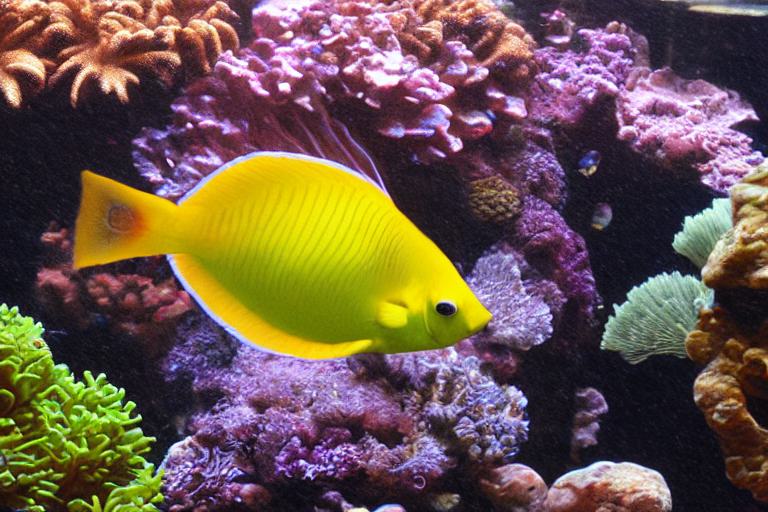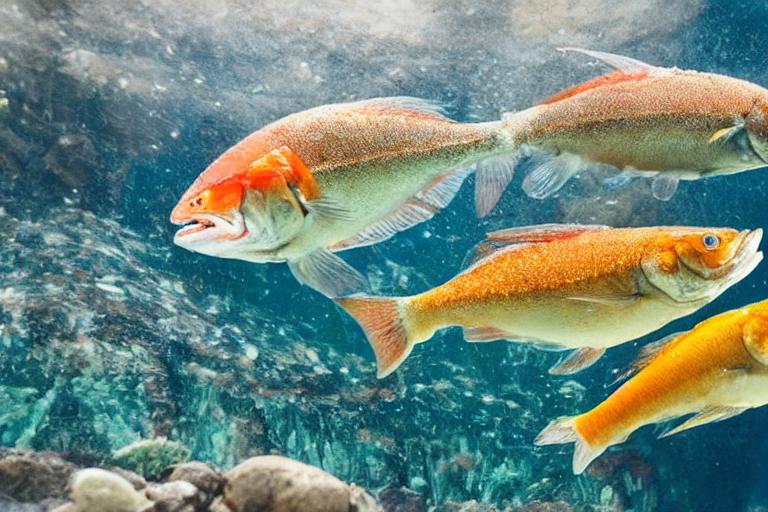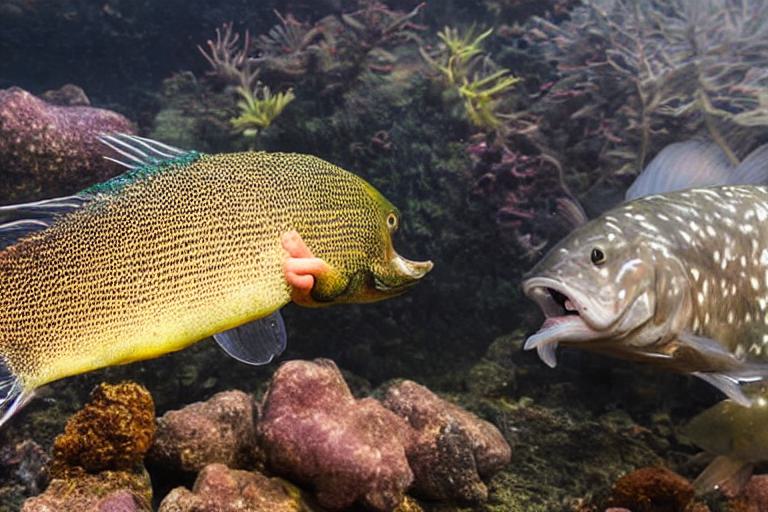Tropical fish and cold water fish are two very different types of animals. Tropical fish are those that live in warm water, while cold water fish are those that live in cold water. There are many differences between these two types of fish, including their appearance, their behavior, and their habitat.
What are tropical fish?
Tropical fish are fish that live in warm water, typically between 77 and 86 degrees Fahrenheit. Tropical fish come in a wide variety of shapes, sizes, and colors, and many are popular in the aquarium trade. They are found in the waters around the world’s tropical regions, including the Pacific, Atlantic, and Indian Oceans.
They often have brighter colors and patterns, and their fins are often longer and more elaborate. Tropical fish also tend to be more social, and many species can be kept together in a community tank. Tropical fish are typically more active and colorful than their cold water counterparts.
As a result, tropical fish require more frequent water changes and more careful monitoring than cold water fish. One of the main differences between tropical and cold water fish is that tropical fish require more care and attention. They are more sensitive to changes in water temperature and quality, and they are more likely to contract diseases.

What are cold water fish?
There are two main types of fish: cold water fish and tropical fish. Cold water fish live in water that is below 70 degrees Fahrenheit, while tropical fish live in water that is above 70 degrees Fahrenheit.
These fish are typically found in the warm waters of the Caribbean and the Indo-Pacific region. Tropical fish, on the other hand, include species such as clownfish, angelfish, and parrotfish. Some examples of cold water fish include salmon, trout, and halibut. These fish are typically found in rivers and lakes in North America and Europe.
For one, cold water fish are typically larger in size than tropical fish. So, what are the main differences between cold water fish and tropical fish? Finally, cold water fish typically have a shorter lifespan than tropical fish. Additionally, cold water fish have a higher fat content than tropical fish, which helps them stay warm in their chilly environment.

Main differences
The main difference between the two is the temperature that they can tolerate. Tropical fish are those that come from warm waters, while cold water fish are those that come from colder waters. Tropical fish need warm water to survive, while cold water fish can tolerate colder water.
Tropical fish eat mostly small insects and crustaceans, while cold water fish eat mostly small fish and invertebrates. Another difference between tropical and cold water fish is the type of food they eat.
This is because the warm water brings out the colors in their scales. Tropical fish are also usually more brightly colored than cold water fish. Cold water fish are usually a duller color because the cold water doesn’t allow the colors to be as vibrant.
Temperature
When it comes to fish, there are two main types: tropical and cold water. But what are the other differences between these two types of fish? As their names suggest, tropical fish live in warm water, while cold water fish live in cooler water.
Cold water fish, on the other hand, can be more drab in color because they don’t need to stand out as much in the clearer waters they live in. This is because they need to be more visible in the murky, warm waters they live in. For one, tropical fish are usually more brightly colored than cold water fish.
So, tropical fish have to compensate by being smaller so they can take in more oxygen. Tropical fish also tend to be smaller than cold water fish. This is because the warm waters they live in don’t hold as much oxygen as the cooler waters that cold water fish live in.
Finally, tropical fish tend to have shorter lifespans than cold water fish. This is because the warm waters they live in are more stressful and damaging to their bodies than the cooler waters that cold water fish live in.
So, if you’re looking for a brightly colored, small fish that won’t live very long, a tropical fish is probably the right choice for you. But if you’re looking for a more long-lived fish that can handle cooler water, a cold water fish is probably a better option.
Heater requirement
Tropical fish need a heater to maintain a water temperature of around 78-80 degrees Fahrenheit, while cold water fish can do well in water that is 60-70 degrees Fahrenheit. This is because tropical fish come from waters that are naturally warm, so they are not used to sudden changes in temperature. When it comes to tropical fish, one of the main differences between them and cold water fish is the heater requirement. A cold water fish, on the other hand, is acclimated to living in waters that can fluctuate in temperature, so they can handle sudden changes better.

Appearance
When it comes to fish, there are two main types: tropical and cold water. While there are some similarities between the two, there are also some key differences. As their names suggest, tropical fish come from warm waters, while cold water fish come from colder climates.
Cold water fish, on the other hand, tend to be more drab in color. This is because they need to be more visible in their murky, tropical waters. When it comes to appearance, tropical fish are often more brightly colored than cold water fish. This helps them blend in with their surroundings and avoid predators.
Tropical fish tend to have larger fins, which help them move through the water more easily. This helps them conserve energy in their colder waters. Another difference between tropical and cold water fish is the size of their fins. Cold water fish, on the other hand, have smaller fins.
So, when it comes to tropical vs cold water fish, there are some key differences to take into account. From appearance to fin size, each type of fish has adaptations that help them survive in their specific environment.
Variety
The main difference between tropical and cold water fish is the temperature of the water in which they live. Tropical fish live in water that is warm year-round, while cold water fish live in water that is cool or cold. There are a variety of fish that live in both tropical and cold water environments, but there are also many fish that are found exclusively in one or the other.
Another difference between tropical and cold water fish is the type of food they eat. Cold water fish, on the other hand, tend to eat larger prey, such as other fish and squid. Tropical fish tend to eat smaller prey, such as insects and crustaceans.
Tropical fish typically lay their eggs in large batches, which increases the chances that at least some of the eggs will survive to adulthood. Cold water fish, on the other hand, typically lay their eggs in smaller batches, which decreases the chances that any of the eggs will survive to adulthood. Finally, tropical and cold water fish also differ in their reproductive strategies.
Tank Size
Cold water fish are also more active and need more space to exercise. The size of a fish tank is one of the main differences between tropical and cold water fish. Tropical fish need more space to swim and explore, while cold water fish do not.
It is important to have the correct size tank for the type of fish you want to keep. Tropical fish tanks can be as small as 10 gallons, while cold water fish tanks need to be at least 20 gallons. If you have a small tank, you will need to choose tropical fish that do not grow too large.
Tropical fish need more protein and live food, while cold water fish can eat pellets or flakes. Another difference between tropical and cold water fish is the type of food they eat.
When choosing a fish tank, it is important to consider the size, activity level, and diet of the fish you want to keep. By doing this, you can ensure that your fish will be happy and healthy in their new home.
Filtration requirements
Secondly, the tank must have a aeration system to provide oxygen to the fish. The first is that the water must be filtered to remove impurities and toxins. There are several filtration requirements that are necessary when keeping tropical fish as pets. A good filtration system will also help to keep the water temperature stable. Lastly, the tank should be equipped with a UV light to help prevent the spread of disease.
Frequently Asked Questions
1. What are the main differences between tropical and cold water fish?
Tropical fish are typically found in waters that are warm and have a high temperature, while cold water fish are found in waters that are cooler and have a lower temperature. Tropical fish also tend to be more brightly colored than cold water fish.
2. What kind of environment do tropical fish need?
Tropical fish need an environment that is warm and has a high temperature. They also need access to plenty of food and hiding places.
3. What kind of environment do cold water fish need?
Cold water fish need an environment that is cooler and has a lower temperature. They also need access to plenty of food and hiding places.
4. How do I care for tropical fish?
To care for tropical fish, you will need to provide them with a warm and humid environment. You will also need to feed them regularly and provide them with hiding places.
5. How do I care for cold water fish?
To care for cold water fish, you will need to provide them with a cool and humid environment. You will also need to feed them regularly and provide them with hiding places.
6. What are some common diseases that affect tropical fish?
Some common diseases that affect tropical fish include parasites, fungal infections, and bacterial infections.
7. What are some common diseases that affect cold water fish?
Some common diseases that affect cold water fish include parasites, fungal infections, and bacterial infections.
8. What should I do if my tropical fish is sick?
If your tropical fish is sick, you should take it to a vet or a fish store as soon as possible.
9. What should I do if my cold water fish is sick?
If your cold water fish is sick, you should take it to a vet or a fish store as soon as possible.
10. Are there any special considerations I need to take into account when keeping tropical fish?
When keeping tropical fish, you need to take into account their need for a warm and humid environment. You also need to be aware of the possibility of diseases.
Final thoughts
There are many differences between tropical and cold water fish, but the main ones are the temperature of the water they live in, the types of food they eat, and the way they breathe. Tropical fish are usually brightly colored and have different patterns than cold water fish. They also tend to be smaller in size. Cold water fish are usually gray or brown in color and have a different body shape. They also tend to be much larger in size.
